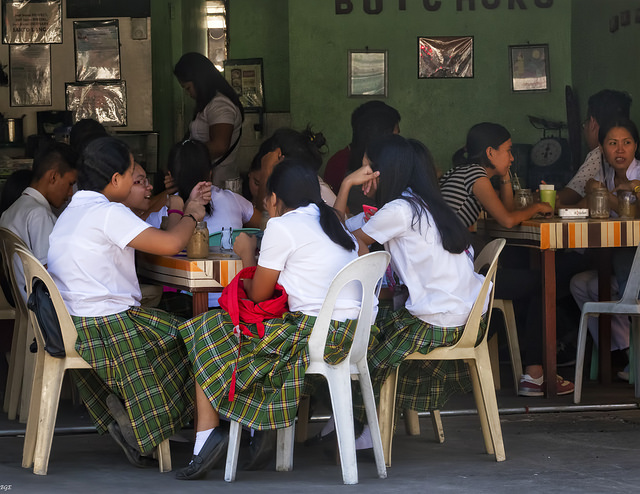News
Senate approves Nat’l School Feeding Program bill on 3rd reading

The Senate on Monday passed on third and final reading Senate Bill 1279 or the “National School Feeding Program Act” which seeks to institutionalize school feeding programs across the country to combat hunger and undernutrition among students. (Photo by Brian Evans/Flickr, CC BY-ND 2.0)
MANILA — The Senate on Monday passed on third and final reading Senate Bill 1279 or the “National School Feeding Program Act” which seeks to institutionalize school feeding programs across the country to combat hunger and undernutrition among students.
Also known as the “Masustansyang Pagkain Para sa Batang Pilipino” Act, the proposed bill was approved 18-0 with no abstention.
The administration-backed measure aims to provide enough and appropriate food to more than 1.3 million Filipino students categorized by the Department of Education (DepED) as “wasted” or “severely wasted.”
Among the main objectives of SB 1279 included the establishment of free and sustainable feeding programs in all public schools across the country; the utilization of local raw products from small-scale farmers and businesses for the program; encouraging public schools to maintain the Gulayan sa Paaralan program; promoting community as well as private sector participation in the feeding program; and improving students’ performance in national aptitude examinations in particular, and in school academics, in general.
Senators have earlier emphasized the importance of sustainable school feeding programs in public schools to address the hunger issues among students.
Studies have shown that the Philippines ranked 9th among countries with the highest prevalence of stunted kids.
Based on Food Nutrition and Research Institute (FNRI) data as of 2015, stunting or the chronic malnutrition rate among Filipino children is at 33.4 percent.
In the meantime, the authors and sponsors of the SB 1279 lauded its passage.
Sen. Grace Poe, one of the principal authors, said the legislation acts as a safety net for students suffering from malnutrition.
“It is definitely one of the safety nets for the poor at a time when prices of basic goods and food are increasing. It is a measure to save the pain inflicted by the burdensome demands that we have now,” the lady senator said.
“Higit pa, walang leakage kung diretso sa sikmura ng ating mga anak. (There is no leakage if this will go straight to the stomachs of our children.) Ito po ang ating (This is our) investment for the future. Ako’y nagpapasalamat kasi ngayon kung ito ay maipapasa na lalung-lalo na kung kasama ang Lower House, ang ating mga anak sa public schools ay meron nang makukunan ng pagkain, (I’m thankful because if this will be passed especially with the Lower House, our children in public schools will have source of food.)” Poe added.
The House of Representatives has passed on third reading a counterpart bill, HB 5269, in June last year.
Meanwhile, Senator Paolo Benigno “Bam” Aquino, the former chair of the Senate Committee on Education, Arts and Culture and the principal author of SB 1279, said that by instituting an effective program with the participation of the community and the local and national governments, all public school children in the kindergarten and elementary levels will soon enjoy free access to nutritious food.
He said that while the DepEd has a school-based feeding program currently in place, the government allocated only enough to feed around 500,000 severely-wasted students or about PHP 4.8 billion in 2016.
“The government spent only 0.52 percent of its annual national budget on nutrition. The global average is 2.1 percent. We need to allocate more to be at par with international standards,” Aquino said.
On the other hand, Senator Juan Miguel Zubiri pointed out that the proposed legislation will benefit farmers and fisherfolk, as produce and ingredients to be used in the program would be sourced from local producers and suppliers.
“This program is a two-pronged approach in solving the malnutrition and hunger problems of our school children as well as giving more opportunities for our local farmers and fisherfolk to market their produce which in effect would increase their income,” he said.
“This will not be the usual feeding program where children are fed porridge. The menu for this program would be intensively studied with consideration to many factors such as the age range and cultural eating preferences of schoolchildren,” Zubiri said.
With its passage in the Senate, the measure will now be sent to a bicameral conference committee to discuss the disagreeing provisions of the Senate and House versions.





















